
Artificial Intelligence and the Future of Sex Education: Revolutionizing Sexual Health
Bill Taverner, MA, CSE
This presentation explores how artificial intelligence (AI) can revolutionize sex education. Learn about cutting-edge Al tools like chatbots, virtual reality simulations, and personalized content. Engage in an exciting discussion on the ethical considerations involved in using Al for sexual education purposes.
Yes, this description was written by AI.
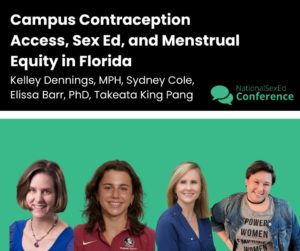
Campus Contraception Access, Sex Ed, and Menstrual Equity in Florida
Kelley Dennings, MPH
Sydney Cole
Elissa Barr, PhD
Takeata King Pang
Our presentation will discuss research that analyzed reproductive resource availability across college campuses. We will co-present with Florida health experts to discuss providing and advocating for sexual education and gender equity resources on and off college campuses.
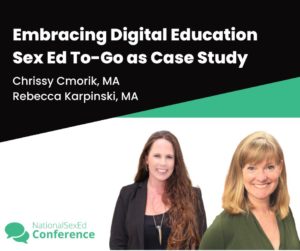
Embracing Digital Education: Sex Ed To-Go as Case Study
Chrissy Cmorik, MA
Rebecca Karpinski, MA
Sex Ed To-Go is an invaluable and FREE online sex education resource provided by Planned Parenthood Pacific Southwest. It is designed for students, teachers, parents, and caregivers and has garnered over 30,000 enrollments globally. Discover the driving force behind this product, the challenges and valuable insights it offers, and how it can benefit you.

Expansion of Health Resource Rooms to Middle Schools
Dena Cox, MPH, CPH, MCHES®
Nyreida Herman
This session will allow participants to learn how the New York City Public Schools’ Office of School Wellness Programs is addressing the gap between middle school students’ rights to sexual health services and their access to those services through expanding Health Resource Rooms to all secondary schools.
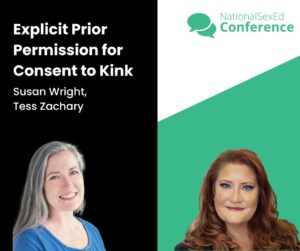
Explicit Prior Permission for Consent to Kink
Susan Wright, MA
Tess Zachary
Explicit Prior Permission is the new legal framework for consent to kink that will be published in the revised Model Penal Code on Sexual Assault in 2024 by the American Law Institute. Learn how to provide education about Explicit Prior Permission for ongoing, affirmative consent for kink.

The Hyper-Sexualizion of the Black Body
Candace Hardnett, MDiv
Michelle Slaybaugh, MEd
The hyper-sexualization of the Black body gives historical reflection regarding the strategic plan to over-sexualize Black people and how that plan has carried into modern society. The hyper-sexualization of Black people contributes to the misrepresentation of the Black community as it relates to sexuality and sexual health.
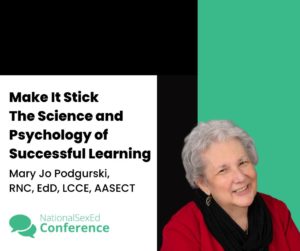
Make It Stick: The Science and Psychology of Successful Learning
Mary Jo Podgurski, RNC, EdD, LCCE, AASECT
As educators, we aim to make our lessons “stick” and stay relevant to our students. Drawing on recent discoveries in cognitive psychology and other disciplines, this session will provide insights into how memory is encoded, consolidated, and later retrieved. This session will appeal to anyone interested in the challenge of learning.
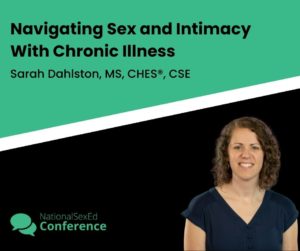
Navigating Sex and Intimacy With Chronic Illness
Sarah Dahlston, MS, CHES®, CSE
The impact of chronic illness on a person’s experiences of intimacy is often overlooked. This session will focus on the challenges of navigating sex and intimacy with chronic illness. It will share practical steps and resources for having honest conversations, creative ways to make sex work, and tips for self-advocacy.
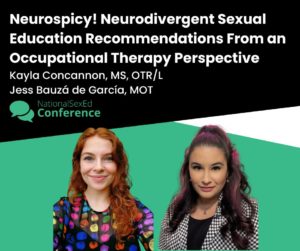
Neurospicy! Neurodivergent Sexual Education Recommendations From an Occupational Therapy Perspective
Kayla Concannon, MS, OTR/L
Jess Bauzá de García, MOT
Over 50 million people in the United States are neurodivergent. Most professionals are working with neurodivergent clients, whether intentionally or accidentally. Neurospicy folks are often underserved in terms of sexual education due to historically ableist views. This session will approach topics with a trauma-informed, neuro-affirmative, and LGBTQIA+ affirming lens.
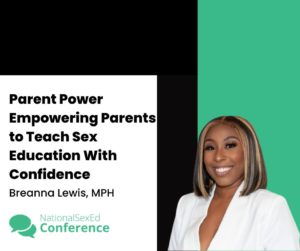
Parent Power: Empowering Parents to Teach Sex Education With Confidence
Breanna Lewis, MPH
This presentation will equip educators and health professionals with strategies, tools, and resources to empower parents to take on the primary sex educator role.

Parents’ Views on Sex Education: New National Data You Can Use!
Julia Bennett, MPH
Come see the results of Planned Parenthood Federation of America’s new national qualitative and quantitative research, including parents’ perceptions, hopes, and fears of school-based sex education in elementary, middle, and high school. We will also share message testing results to support your parent and adult stakeholder engagement on the ground.
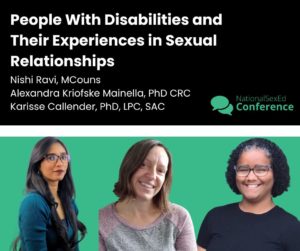
People With Disabilities and Their Experiences in Sexual Relationships
Nishi Ravi, MCouns
Alexandra Kriofske Mainella, PhD CRC
Karisse Callender, PhD, LPC, SAC
This educational session will share the results of a qualitative study on the lived experiences of individuals with disabilities and their experiences in sexual relationships. Sexual health educators in any setting will receive important considerations and recommendations for accessible and inclusive sex education practices.
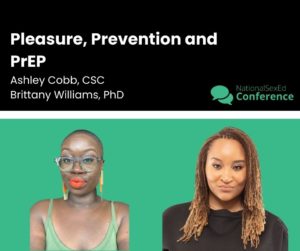
Pleasure, Prevention, and PrEP
Ashley Cobb, CSC
Brittany Williams, PhD
This webinar will examine individual and collective behaviors that increase the likelihood of exposure to STIs or HIV. It will discuss methods of prevention that support healthy, pleasurable experiences.
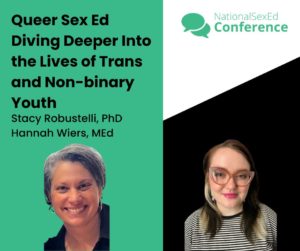
Queer Sex Ed Diving Deeper Into the Lives of Trans and Non-binary Youth
Stacy Robustelli, PhD
Hannah Wiers, MEd
In this workshop, we cover some of the challenges trans and nonbinary youth face as they go through puberty, the kinds of affirming gear that is available to reduce gender dysphoria, and some of the common themes that trans and non-binary youth identify as they enter intimate relationships.
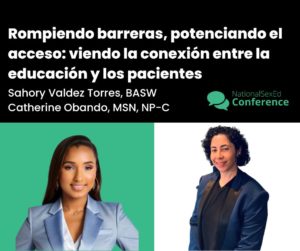
Rompiendo barreras, potenciando el acceso: viendo la conexión entre la educación y los pacientes
Sahory Valdez Torres, BASW
Catherine Obando, MSN, NP-C
Linguistic barriers marginalize Latinx students in sexual health education. Spanish-speaking pupils deserve curriculum translations. We must remove obstacles hindering vital comprehension. Clinicians observe a lack of effective communication and understanding in the sexual education provided to the Latinx community. This education should accurately represent their experiences and empower them, but there is currently a disconnection in achieving these goals.
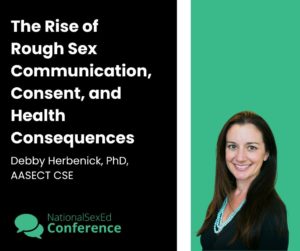
The Rise of Rough Sex: Communication, Consent, and Health Consequences
Debby Herbenick, PhD, AASECT CSE
Rough sex practices (choking/strangulation, slapping, consensual non-consent) have increased in prevalence and often occur in adolescence and young adulthood. In this presentation, Dr. Herbenick will present key findings from her team’s research on rough sex practices pertaining to communication, consent, and health consequences of even consensual experiences.

Sex After Giving Birth
Shelly Stover, MA
This presentation will address sex education for pregnant people and parents and how to promote sex positivity for the population who have given birth and are navigating a new relationship with their bodies and identities.

Sex Education for All: Introducing a New Resource on Diversity, Equity, Inclusion, and Belonging
Tanya M. Bass, PhD, MEd, MS, CHES®, CSE
Bill Taverner, MA, CSE
This webinar will explore a forthcoming publication by The Center for Sex Education on addressing diversity, equity, inclusion, and belonging (DEIB) in sex education. The speakers will highlight findings from a national survey and key elements in this publication, including recommendations assigned by participants for 11 elements of DEIB.
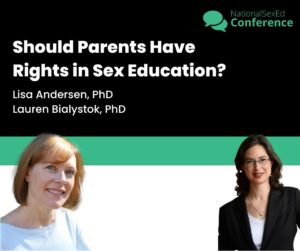
Should Parents Have Rights in Sex Education?
Lisa Andersen, PhD
Lauren Bialystok, PhD
Opponents of sex education are increasingly invoking “parents’ rights” as a framework for removing their children from sex education. The authors of Touchy Subject: The History and Philosophy of Sex Education will survey the context of parents’ rights and explain what should or should not fall under parents’ authority.

Sex Ed for the Stroller Set: Educating Parents with Children Age 0-6 Years Old
Laura Hancock
Karen Rayne, PhD, CSE
This webinar provides participants with guidance on how to teach parents of young children to be informed, confident sex educators. By the end, participants will have a list of the most important things to teach parents and a step-by-step guide to starting their own class for parents of young children.
